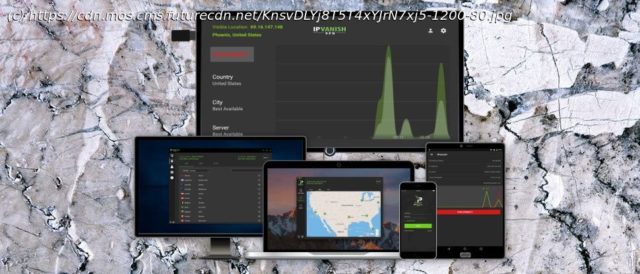IPVanish is a fast VPN that is highly configurable and offers clients for Windows, Android and iOS.
US-based IPVanish is an appealing VPN provider with a long list of features, including several that you won’t often see elsewhere. IPVanish has a decent-sized network with 40,000+ shared IPs, and 1,500 P2P-friendly servers (up from 1,300 last time) in 75+ locations. Some VPNs give you more, but, the website explains, IPVanish is ‘the world’s only Top Tier VPN service provider’. The company owns and manages its own servers rather than renting other people’s hardware, giving it far more control over how the network and servers are set up and run. This also demonstrates a level of resources and expertise which you won’t often see with other VPNs. A wide range of clients covers Windows, Mac, Android, iOS, even Amazon Fire TV, as well as providing a host of setup guides for routers, Linux, Chromebooks and other platforms. IPVanish previously supported connecting up to a generous 10 devices simultaneously, and now it’s even better: there are no fixed limits at all. 24/7 live chat support is available if you need it, but even here, IPVanish delivers a little more than we expected. There’s phone support, too, though with more limited hours (9am – 5pm CT, Monday to Friday). Like NordVPN and Hotspot Shield, IPVanish is expanding its horizons and branching out into other security and privacy areas. As a first step, IPVanish accounts now include 250GB of free secure storage space via SugarSync (worth $9.99 a month). That could be very useful, and as IPVanish now calls its product a ‘security suite’ we expect more functions and features will be arriving very soon. IPVanish pricing starts with monthly accounts at $5 for the first month, $12 on renewal. A quarterly plan doesn’t save you very much at $4.50 a month for the first term, $9 on renewal. The best value is with the annual plan at just $3.25 a month for year one, $6.50 afterwards. If you’ll make regular use of SugarSync, this looks like an excellent deal. Buy SugarSync direct from the SugarSync site and you’ll pay $10 a month, so opting for the IPVanish plan saves a pile of cash and gets you the VPN effectively for free. It could also be appealing if you’d just like to trial the SugarSync service over a long period, see how it works for you. The $3.25 a month price for year one is less than even some value VPN providers (Ivacy asks an effective $3.50 a month for its annual plan, Private Internet Access charges $3.33), so you can think of it as a free one-year SugarSync trial. f you’ve no real need for web storage, though, opting for another VPN provider could save you a lot of cash. Surfshark’s two-year plan costs just $2.50 a month for the first term, for instance, an upfront payment of $60. IPVanish requires $39 for year one, $78 for year two, $117 in total. Testing isn’t quite as easy or convenient as we’d like. There’s no free trial, although you do now get a 30-day money-back guarantee to bring it in line with most other VPNs – while CyberGhost and Hotspot Shield give you 45 days. If you decide to sign up, IPVanish accepts payments via card and PayPal. IPVanish protects your privacy with its use of rock-solid, industry-standard AES-256 encryption, and its support for the highly secure protocols, OpenVPN and IKEv2. The IPVanish apps go further by giving you an unusual level of control over their OpenVPN setup. The ability to choose your OpenVPN port (1194 or 443) may help you connect, while a ‘Scramble OpenVPN Traffic’ option reduces the chance of your VPN tunnel being detected or blocked in anti-VPN countries such as China or Iran. The Windows client offers a kill switch, DNS and even IPv6 leak protection to reduce the chance that your real identity will be exposed online, for example if the VPN connection drops. Privacy pluses elsewhere include the iOS app’s ability to create lists of wireless networks which IPVanish will always protect, and others which it can ignore, as you know they’re safe. You can then mostly leave the VPN to turn itself on and off as required, preserving your privacy at all times. To confirm the service really does preserve your identity, we checked for leaks at sites including IPLeak, DNS leak test and Do I Leak. None of the tests revealed any issues, with the apps shielding our real IP address at all times. Point your browser at IPVanish’s website and you’ll read what seems to be a clear no-logging policy. “Our strict zero-logs policy keeps your identity under wraps. We do not record any of your activity while connected to our apps in order to preserve your civil right to privacy.” We like to check the big claims on the front of a website with the small print at the back, but in this case, the IPVanish privacy policy says much the same thing. “IPVanish is a zero-logs VPN service provider, which means that we do not keep a record of any connection, traffic, or activity data in regard to our Services.” Comforting words, but customers shouldn’t have to blindly trust any provider’s website promises. VPN providers such as NordVPN, TunnelBear and VyprVPN have tried to reassure their customers by allowing external companies to audit their systems and find out what’s really going on. Hopefully IPVanish – and the rest of the industry – will follow suit. We began our performance tests by using Speedtest.net, TestMy.net and other benchmarking websites to find the best download speeds from a European data center. OpenVPN speeds were inconsistent and below average at 40-100Mbps (NordVPN’s NordLynx protocol managed 300-350Mbps, and more.) Performance picked up significantly when we switched to IKEv2, though, with downloads achieving 150-200Mbps. US download speeds were even better at around 210-230Mbps, with the lowest individual test result of 162Mbps. That’s more than enough for most applications. Switching to long distance connections saw some problems. UK to Australia speeds barely reached 2Mbps, for instance; yes, that’s a very long distance, but we found NordVPN’s UK to Australia connections routinely hit 40-50Mbps. Overall, it looks like IPVanish is capable of delivering decent speeds. This can vary considerably depending on your location and your chosen server, though, so if you do sign up, be sure to run some intensive speed tests on your favorite routes. Unlike some of the competition, IPVanish doesn’t boast about its website unblocking abilities. Browse the website and you’ll eventually find its Services page, but that’s limited to relatively unprotected sites such as Sling TV, Spotify and YouTube. Does this mean IPVanish doesn’t have much to boast about? Our iPlayer tests seemed to confirm that, as none of the UK servers got us access, a repeat of what we found during our last review. All US VPN servers allowed us to watch geoblocked YouTube clips. That’s not such a big deal – everyone else does, too – but we like to check, anyway, just to confirm there are no problems. We were more surprised to see that, although IPVanish doesn’t seem keen to talk about it, all test servers gave us access to US Netflix. That’s a far better performance than you’ll see with many competitors, and one which earned the company a place on our best Netflix VPN list. The service couldn’t help us with Amazon Prime Video, unfortunately – the site recognized we were using a VPN and refused to stream content.






